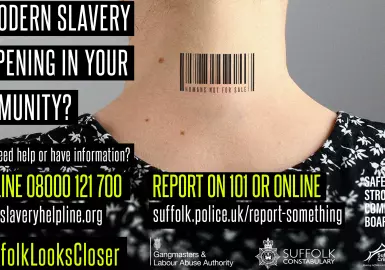
Events will take place in Ipswich and Bury St Edmunds, with details as follows: • University of Suffolk, Ipswich – 12pm - 2pm in the Student Union • St Edmundsbury Cathedral, Bury St Edmunds – 10am – 3pm
Modern slavery is the exploitation of people, often by organised crime groups, and affects society’s most vulnerable men, women and children. These can include victims that have been brought from overseas, as well as UK nationals in Suffolk. It takes the form of a number of exploitation types, including sexual exploitation, forced labour and domestic servitude and targets many different industries, including hotels, nail bars, car washes, agriculture and construction. Last year 81 investigations were recorded in Suffolk under the Modern Slavery Act, with 146 potential victims identified and referred to the National Referral Mechanism. Many of these investigations are linked to County Lines, with young people and vulnerable people enticed and recruited to transport and sell drugs, with criminal gangs subsequently using coercion, intimidation, violence and weapons to exploit their victims.
Suffolk’s Police and Crime Commissioner Tim Passmore, who will be at the Bury St Edmunds event on Tuesday, said: “I am very pleased to see Suffolk Constabulary working closely with partners on Anti-Slavery Day to highlight human slavery. “Sadly modern slavery is all around us, hidden in plain sight. As I speak to people across the county it is clear many are completely unaware of the consequences of this horrendous issue. But modern slavery is something we all need to be aware of because it is happening in Suffolk and the impact of this evil crime on victims is totally devastating. “Signs of modern slavery are often hidden from view, making it hard to recognise the victims amongst us but I would urge everyone to be vigilant and report anything suspicious. “It is only by working together we will raise awareness of modern slavery and the abuse and injustice that is associated with this abhorrent crime and bring these evil criminals to justice.”
Carol Dickinson, Modern Slavery Vulnerability Co-ordinator for Suffolk Constabulary, said: “Modern slavery is a complex crime that often goes unreported and undetected so the actual number of people affected by this type of crime in the county is unknown. “Our dedicated Modern Slavery and Vulnerability team work alongside local authorities and welfare partners to share information and intelligence on exploitation and abuse and address the longer-term safeguarding needs of victims. We also regularly visit local businesses and engage with employees to identify potential victims. “Often victims are vulnerable and isolated, fearful or unwilling to come forward to the police and not willing to engage with us. Sometimes they don’t realise they are victims that have been groomed into criminality. Modern slavery is a hidden crime and we are trying to raise awareness that we do not want to criminalise victims. It’s our aim to protect them. “By holding these events, which we do throughout the year, we hope to open people’s eyes to the slavery that is hidden in our communities. Spotting Modern slavery can be challenging and we really need help from the public to report concerns of abuse so that we can help and safeguard victims. “We put victims at the heart of everything we do and last year we, alongside Safer Stronger Communities Board, joint funded emergency ‘Go Bags’, which provide basic essentials including toiletries, a food voucher and a mobile phone to victims of Modern Slavery. These bags give victims a little bit of dignity back as they take their next steps towards independence.”
Spot the signs It’s important that people are aware of how to spot the signs of someone who is being exploited. Victims may: • look malnourished or unkempt • be withdrawn and unwilling to interact • live in cramped, dirty, overcrowded accommodation • have no identity documents • appear scared, avoid eye contact, and be untrusting • show signs of abuse and/or have health issues Typical kinds of employment that they may be forced into include: • factories and farm work • restaurants, in particular fast food outlets • domestic service and hospitality • the construction industry • hand car washes and nail bars They may also be forced into sexual exploitation as well as into crime, such as: • pick-pocketing • begging • burglaries • the illegal drug industry
Help and support If you need help or think someone you know is at risk: • call 999 if there is immediate danger • contact us on 101for help and support, we also have a number of translators available if English is not your first language • contact the Modern Slavery helpline on 0800 0121 700. Open 24/7 with free/confidential advice available in 200 languages • contact the Salvation Army referral helpline 0300 303 8151 • contact Crimestoppers anonymously on 0800 555 111 If you suspect that someone is being exploited or has been trafficked, do not confront the person who you believe is responsible, or let the victim know of your suspicions, as you may risk putting them and yourself in more danger.